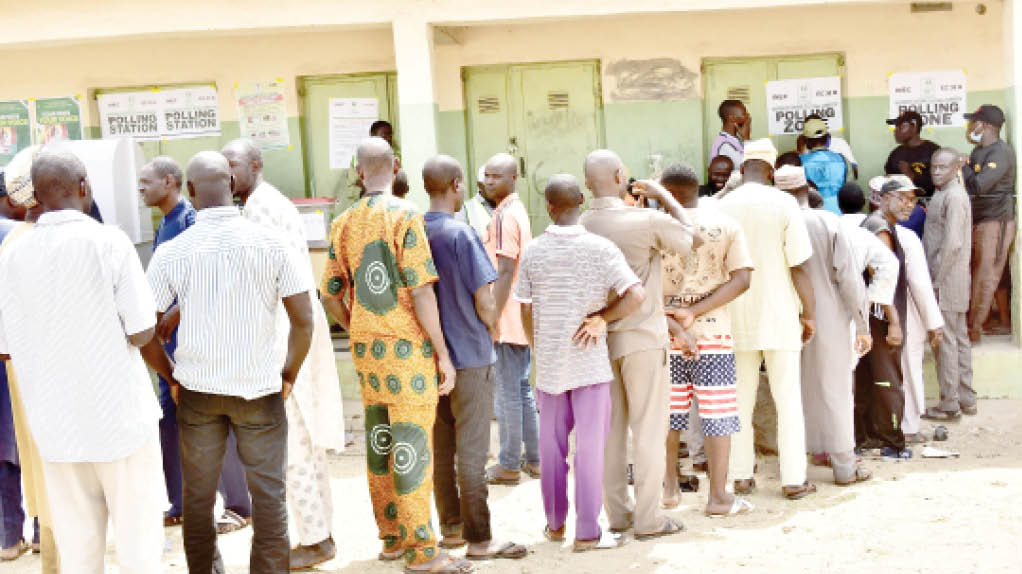As we march to the polls tomorrow…
Tomorrow, February 25, Nigerians of voting age, in fact a total of 93.46 million registered people, will troop to their respective polling booths to elect a new president, as well as members of the National Assembly. And in another two weeks, March 11, they will head to the next batch of polls to elect governors […]

Voters waiting to cast their votes in Abuja
Tomorrow, February 25, Nigerians of voting age, in fact a total of 93.46 million registered people, will troop to their respective polling booths to elect a new president, as well as members of the National Assembly. And in another two weeks, March 11, they will head to the next batch of polls to elect governors and members of State Houses of Assembly.
At stake tomorrow will be the selection from 4,259 contestants comprising of 36 presidential and vice presidential candidates for the offices of president and vice president; 1,101 candidates for the 109 senatorial seats; and 3,122 candidates for the 360 seats in the House of Representatives.
On March 11, 2023, voters will decide the fate of 837 candidates contesting in the governorship elections holding in 28 states and the 10,240 candidates vying for 993 State Houses of Assembly seats.
It is expected that every Nigerian of at least 18 years of age, who must have collected their Permanent Voters’ Card (PVC) would exercise this very important civic duty.
UNICEF, Kashere varsity counter fake news
News FCT Muslim pilgrims’ board director assumes duty
It is indeed a milestone as it will be Nigeria’s seventh consecutive general election since the return to uninterrupted democratic system of government in 1999.
And it will showcase how far the Independent National Electoral Commission (INEC), political parties and contestants, security agents, the Nigerian voter and other stakeholders are willing to live up to the expectations of their offices and commitments.
Therefore, Nigerians would not entertain any excuses for failure. It has taken four years to prepare for this and the federal government has not spared its purse to fund this election.
To this end, Daily Trust enjoins all stakeholders to be abreast of all aspects of the constitution and the Independent National Electoral Commission (INEC) rules and regulations, as these constitute the legal framework that regulates our electoral process.
The nation’s defence and security agencies will be on full deployment, including personnel from Nigerian Army, Navy and Air Force, Police, Department of State Services (DSS), Nigeria Security and Civil Defence Corps (NSCDC), Federal Road Safety Corps (FRSC) and the Federal Fire Service.
They must ensure that no non-state actor threatens the smooth conduct of the elections. It is their solemn duty to ensure the conducive environment for deployment of INEC’s 1,642,386 polling and collation officers with sensitive and non-sensitive materials across 774 local government areas, 8,809 electoral wards and 176,846 polling units across the country. The security agencies are to ensure the secure movement of the over 100,000 vehicles and about 4,200 boats that will deliver these required resources.
Moreover, these agencies and operatives must adhere fully to the Code of Conduct and Rules of Engagement for Security Officials on Electoral Duty, which serves as uniform standard of conduct guiding the behaviour of all security agents from various agencies involved in election duty.
It deals with general conduct, duty parade, briefing/debriefing, dress and accoutrement, crowd control, use of force and lethal weapons, escorting and protecting election materials, the procedure of arrest, command and control and other salient electoral security rules.
It also instructs all deployed personnel to remain neutral, non-partisan and transparent in all their actions as there is zero-tolerance for any action and inaction by commanders, at all levels, that is deemed tilted towards giving undue advantage to any candidate, political party, ethnic or religious leanings to the detriment of the unity and integrity of Nigeria.
Specifically, no security official should fall to the old habits of being pawns in the hands of politicians. Also, the deployment of military hardware, fighter jets and helicopters to monitor the conduct of elections should not scare or intimidate voters or election observers.
And it is important that INEC surmounts all logistic challenges and ensures a seamless election by timely conveyance of personnel and large quantities of election materials through the implementation of the Memorandum of Understanding (MOU) that it signed in December 2022 with transport unions across the country.
INEC’s staff must also exhibit the highest form of professionalism, especially with voters while eschewing any appearance of compromise.
Our politicians are again reminded that election is not a do-or-die affair. The 15,336 candidates, their political parties and supporters must eschew violence during and after the elections. They should focus on mobilising voters to the polling booths in order to help stop the perennial issue of low voter turnout as voter apathy is a disservice to democratic ideals.
The politicians and their spokespersons and representatives must watch their reactions. Winners should be magnanimous in victory while losers should go back to the drawing board and wait for the next election season. And they must not forget to abide by the peace accords signed by the presidential candidates of the 18 political parties on behalf of themselves and other contestants, with the National Peace Committee.
Nigerians should troop out and exercise their civic duties. They should see long queues of voters as evidence of maturity of the nation’s democracy.
This election must not only enthrone good governance but also advance our democracy and help Nigeria reassert itself as a leader in the West African sub-region, the African continent, and in global affairs. And most importantly, it should truly reflect the wishes of the majority of Nigerians.
